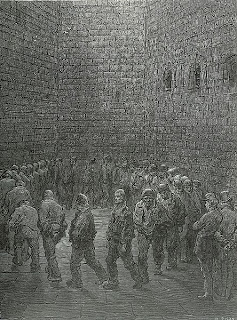The Grapes of Wrath follows a migrant family from the
1930's that are forced to leave the farm they work on in Oklahoma and head for California because
of the great depression. On their journey the family realise that tens of
thousands of people from all over the southern great plains have also been forced from their
homes and the sheer numbers of people are saturating any available jobs in
California. Once they do eventually reach California the family finds hostile
locals, exploitation, prejudice and starvation.
I have read a few reviews and many people either
mention or complain that The Grapes of Wrath will grind you down. I would agree
to an extent, the hopelessness of the family’s situation and the endless relentlessness
of trying to find work and their next meal after 500 pages can wear a reader
down. But this is no bad thing, this really happened to people and it would
have left perhaps a bad taste in my mouth if Steinbeck had tried to make this
terrible situation somehow more uplifting just to make it more palatable for a
lot more readers. While the Grapes of Wrath is very much in parts a social
commentary I feel it is a commentary which is relevant today.
Most of the novel is written from the family’s point of
view but then Steinbeck will stick in a chapter telling a more overall picture
and putting the events into context so in a way the reader becomes more
informed than the family on their own hardships and situation.
This is the kind of novel that is worth the read in the
end as it is the overall fight for survival rather than the individual characters
and events that will stay with you. Brilliantly written and recommended.
Verdict 5/5Posted by Jess







